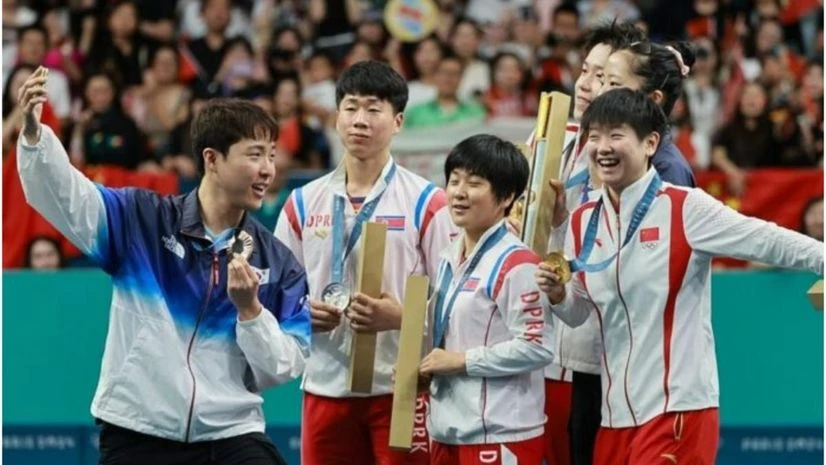)
Medalists in the mixed doubles Olympic table tennis competition take a selfie on the podium Courtesy: World Table Tennis via X)
In a fleeting yet powerful display of sport’s unifying potential, a selfie taken by North and South Korean table tennis players at the Paris Olympics captured global attention, symbolising a rare moment of camaraderie between two nations divided by one of the world’s most fortified borders. However, this moment of goodwill appears to have landed the North Korean athletes in serious trouble back home, reported The Guardian.
The image, which showed South Korean mixed doubles players Lim Jong-hoon and Shin Yu-bin alongside North Korean duo Kim Kum-yong and Ri Jong-sik smiling together on the podium, quickly became one of the most celebrated moments of the Games. The Chinese gold medallists, Wang Chuqin and Sun Yingsha, also joined in the photograph, which garnered hundreds of thousands of likes on the Olympics’ official Instagram page and was recognised by People magazine as one of the top 12 sportsmanship moments in Paris.
Yet, recent reports indicate that this act of friendship may have severe consequences for the North Korean players. According to the Daily NK, a Seoul-based website focused on North Korean affairs, Kim and Ri are now under “ideological scrutiny” after returning to Pyongyang.
The site, citing a high-ranking source, revealed that the athletes, along with members of the North Korean Olympic Committee, have been subjected to a month-long “ideological scrubbing”—a standard procedure for those who have been exposed to life outside the isolated communist state.
The North Korean government had reportedly instructed its athletes not to engage with competitors from other nations, including South Korea, warning of potential punishment for those who did. The table tennis players, in particular, were criticised in an internal report for “grinning” alongside athletes from what the regime describes as its “number one enemy.”
The selfie was taken amid escalating tensions between the two nations. The Korean War (1950-53) ended in a truce, not a peace treaty, and recent developments, including joint military exercises involving South Korea, the US, and Japan, as well as closer ties between North Korean leader Kim Jong-un and Russian President Vladimir Putin, have further strained relations.
The fate of the North Korean athletes remains uncertain. The Korea Times speculated that any penalties might hinge on the level of remorse shown by the athletes for their brief lapse in vigilance during the Games. North Korean athletes are subjected to a rigorous three-stage “ideological review” upon returning from international events, culminating in self-reflection sessions where they are expected to criticise both their teammates’ and their own “inappropriate behaviour.”
While the nature of the potential punishments remains unclear, Human Rights Watch has condemned the situation, urging the International Olympic Committee (IOC) to protect athletes from all forms of harassment and abuse.
In a statement, the organisation emphasised that North Korean athletes should not fear retribution for actions that reflect the Olympic values of respect and friendship.
The case of Kim and Ri is not isolated. The Daily NK recalled the harsh treatment of North Korea’s football team after their poor performance at the 2010 World Cup in South Africa, where they lost all three of their group-stage matches. The players were reportedly subjected to a six-hour excoriation, while their coach, Kim Jung-hun, was forced to work on a construction site
First Published: Sep 02 2024 | 5:04 PM IST


































